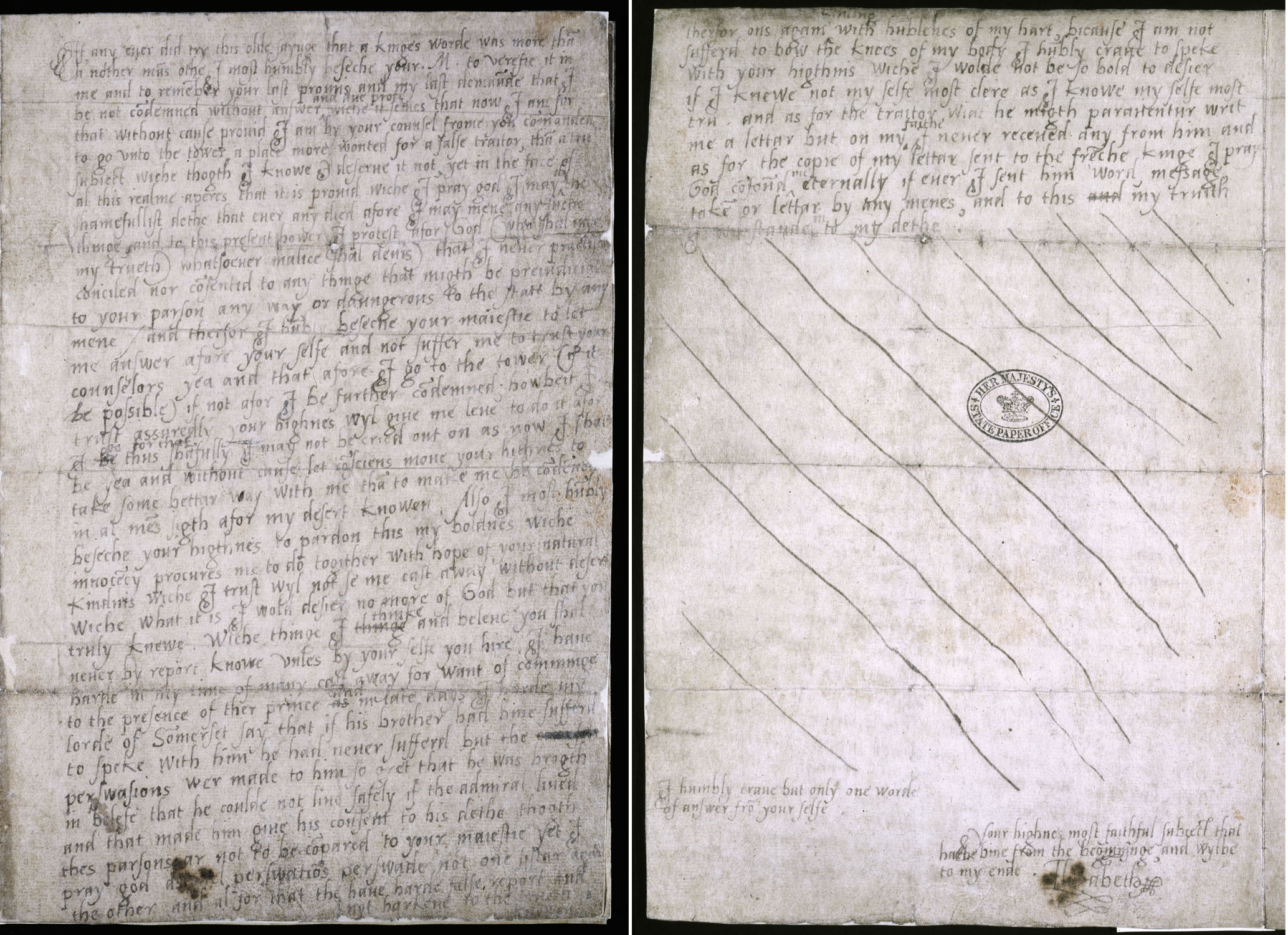The ‘Tide Letter’, Noon, 17 March 1554 (SP 11/4/2 f.3- 3v)
This was one of the most important letters that Elizabeth ever wrote. She had been imprisoned by her half-sister Mary on suspicion of involvement in the Wyatt rebellion, which aimed to overthrow the queen because of her determination to marry Philip of Spain. Having heard that she was to be taken to the Tower, Elizabeth wrote in a desperate attempt to secure an audience with her sister. Fearing that her enemies might alter the text, she struck lines across the blank space above her signature. It is known as the ‘Tide Letter’ because Elizabeth wrote it deliberately slowly so that the daylight low-tide that enabled boats to pass safely under the narrow arches of London Bridge had turned, sparing her from the Tower for an extra day.
Transcript
[f.3] If any ever did try this olde sayinge that a kinges worde was more than a nother mans othe [oath] I most humbly beseche your Majestie to verefie it in me and to remember your last promis and my last demaunde that I be not condemned without answer and due profe wiche it semes that now I am for that without cause provid [proved] I am by your counsel from you commanded to go unto the tower a place more wonted for a false traitor, than a tru subject wiche thogth I knowe I deserve it not, yet in the face of al this realme aperes that it is provid. wiche I pray god I may dye the shamefullyst dethe that ever any died afore [if] I may mene any suche thynge; and to this present hower I protest afor God (Who shall judge my trueth, whatsoever malice shall devis) that I neither practiced, conciled nor consented to any thinge that might be prejudicial to your parson any way or daungerous to the state by any mene [means]. And therefor I humbly beseche your majestie to let me answer afore your selfe and not suffer me to trust your counselors yea and that afore I go to the tower (if it be possible) if not afor I be further condemned, howbeit I trust assuredly your highnes wyl give me leve to do it afor I goe, for that thus shamfully I may not be cried out on as now I shall be, yea and without cause. Let consciens move your highness to take some bettar way with me than to make me be condemned in al mens sigth [sight] afor my desert knowen. Also, I most humbly beseche your higthnes to pardon this my boldnes wiche innocency procures me to do togither with hope of your natural kindnis [kindness] wiche I trust wyl not se me cast away without desert, wiche what it is I wold desire no more of God but that you truly knewe. Wiche thinges I thinke and believe you shal never by report knowe unles by your selfe you hire [hear]. I have harde [heard] in my time of many cast away for want of comminge to the presence of ther prince and in late days I harde [heard] my lorde of Somerset say that if his brother had hime suffer’d to speke with him he had never suffer’d, but the perswasions wer made to him so gret that he was brogth [brought] in belefe that he coulde not live safely if the admiral lived and that made him give his consent to his dethe. Thogth [though] thes parsons [persons] ar not to be compared to your majestie yet I pray god that evil perswations [persuasions] perswade not one sistar agaynst the other and al for that they have harde [heard] false report and not harkened to the trueth.
[f.3v] Therefor ons [once] again kneling [kneeling] with humblenes of my hart, bicause I am not suffer’d to bow the knees of my body I humbly crave to speke with your higthnis wiche I wolde not be so bold to desire if I knewe not my selfe most clere as I knowe my selfe most tru, and as for the traitor Wiat [Wyatt] he migth [might] paraventur [peradventure] writ me a lettar but on my faithe I never receved any from him and as for the copie of my lettar sent to the frenche kinge I pray God confound me eternally if ever I sent him word, message, token or lettar by any menes, and to this my truth I wil stande in to my dethe.
I humbly crave but only one worde of answer from your selfe.
Your hignes most faithful subject that hathe bine from the beginninge, and wylbe to my ende. Elizabeth.
